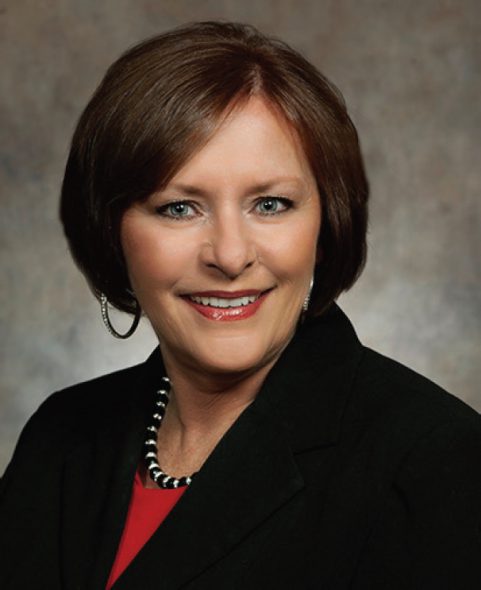Legislators Resist Plans to Help Workers
GOP sniping at Evers plans for workforce training, minimum wage hike, funding to fix UI system.
Republicans who wield the majority in the state Legislature have already proclaimed they will throw out Gov. Tony Evers’ second budget, cutting and pasting the state’s spending plan into something more to their liking. And at a hearing Tuesday on provisions that affect people who work and the people who employ them, GOP lawmakers kept their scissors in full view.
As the Joint Finance Committee grilled Amy Pechacek, secretary-designee for the Department of Workforce Development, the Republicans who control the panel made clear their skepticism about most of Evers’ proposals.
The governor’s 2021-23 budget’s workforce agenda includes revamping the state unemployment insurance (UI) system clobbered by the coronavirus pandemic and the flood of claims that followed record-breaking layoffs. A series of proposals would strengthen the pathways to work for dislocated workers as well as the chronically jobless. And it has called for raising the state minimum wage in increments and restoring worker rights that were eliminated during Scott Walker’s two terms as governor.
Among Evers’ proposals: reinstating collective bargaining rights for at least some public employees that were eliminated by Walker’s Act 10 a decade ago. Another measure repeals the state’s so-called Right to Work law. Another restores the state’s prevailing wage law, which sets minimum pay levels for workers on publicly funded construction projects.
Republican leaders made it clear the day Evers introduced his budget that those measures would be dropped immediately. While the worker rights provisions produced a few critical questions Tuesday, the hearing mostly focused on the other budget details that Pechacek outlined in her 20-minute opening comments. But those didn’t appear to garner much interest either.
The secretary-designee, who hasn’t yet been confirmed after Evers appointed her at the end of December, focused much of her initial remarks on a series of initiatives for worker training and placement. They are part of what the governor is dubbing the “Badger Bounce Back” budget, crafted to help Wisconsin’s economy recover from the damage wrought by the pandemic.
“Prior to the pandemic, we were all talking about employers’ struggles to fill open positions with skilled workers, how certain people in our state were being left behind and how advancing technologies and an aging workforce were only going to make matters worse,” Pechacek said. “Unfortunately, those issues still exist. But on top of those, the COVID-19 pandemic has exacerbated existing economic disparities, and has also likely had a permanent impact on certain industries, resulting in disproportionate effects on certain communities across our state.”
Training and workforce support
Pechacek promoted the budget’s $10 million boost to the state’s existing Wisconsin Fast Forward skills training grants for employers, a $1 million appropriation for training and placing workers in environmentally friendly green industry careers and $8 million for local workforce development boards around the state to offer skills training programs.
She also highlighted $10 million for a pilot program to help state residents who might otherwise have trouble navigating job training programs or sticking with them because of other challenges such as transportation or child care.
Based on a similar Ohio program, the proposal envisions community-based career coaches who would work with the job-seeking participants. “The coach will remain a resource even after the person gets hired so that they can check in and address any new issues that might come up,” she explained.
Unimpressed, Republicans focused on accounts from employers who claimed they couldn’t find workers despite offering good wages, while dismissing efforts to prepare more people for the workforce.
“I can’t wrap my mind around why we would spend $30 million into a worker-connection pilot program,” said Sen. Kathy Bernier (R-Chippewa Falls), citing the state’s 3.8% unemployment rate and lumping the price tags of all three workforce development items together in reference to a single proposal that was one-third the cost.
Sen. Howard Marklein (R-Spring Green), JFC co-chair, described a conversation he said he had with “a pretty good sized employer in my district” who lamented the difficulty of filling openings.
“He said, ‘Howard, we’re not competing with other businesses, we’re not competing with Iowa, we’re not competing with Illinois, we’re competing with the couch,’” Marklein said. With the budget proposal, he asked, “Is there more incentive to work or not work in here?”
Pechacek observed that anyone collecting unemployment hadn’t “historically been sitting on the couch” — but had to have a work history to qualify in the first place. She also noted that jobless workers collecting Wisconsin’s maximum weekly benefit of $370 without health benefits would have difficulty sustaining a family.
Lamenting worker shortages
Rep. Tony Kurtz (R-Wonewoc) questioned the need for worker development programs, suggesting that “there’s some HR departments in the state from businesses that are actually doing that kind of stuff right now.”
Kurtz described a Reedsburg utility installer who complained of being unable to find employees, despite wages of more than $15 an hour. “They just can’t find people,” he said. “These are jobs we have now — these are employers that are seeking and doing anything to get people… I think some people are already actually doing this and doing a very good job.”
Pechacek replied that the Ohio-based pilot program seeks to address the reasons why new hires skip work, because of unexpected glitches in child care or transportation. But Flezkowski wasn’t mollified. “Do we ever go so far as to think there’s too many options not to work?” she asked.
Sen. LaTonya Johnson (D-Milwaukee) questioned some of the anecdotes about high-paying jobs.
“I think we’ve heard a little bit today about people staying at home for UI benefits at $670,”she said, referring to combined state and federal pandemic UI supplements, “but refusing to go to work for $25 an hour, 40 hours a week, which is like $1,000.”
Johnson continued: “Either my math is wrong, or those jobs must really suck, because I can’t fathom why somebody would give up $25 an hour for enhanced UI benefits.”
Johnson then offered her own explanation. “It sounds like to me that a lot of [these jobs] are in more rural areas,” she said, where people might be scarce, “versus someplace like Milwaukee, where you have plenty of able bodied [people] willing to work but don’t necessarily have those types of jobs.”
Fixing state UI system
On the UI revamp, the GOP lawmakers doubled down on previous skepticism about the potential price tag, even for technological changes that were included in legislation the JFC wrote and the Legislature approved earlier this year.
Rep. Mark Born (R-Beaver Dam), the JFC co-chair, questioned why the department had again asked for $80 million to overhaul the UI program’s computer system, when the committee had denied it in its earlier bill and the department had subsequently gotten federal funds for initial work on the project.
“I’m just so overwhelmed by how that testimony from a few weeks ago — ‘we need all this’ — turned out,” Born said. “Most of that wasn’t true at the time, or isn’t true after getting some federal money. ‘But yeah, we still need $80 million.’”
DWD remains hopeful for federal funds, Pechacek replied — but “the project is potentially subject to fail if we don’t have a dedicated funding source to complete it.”
One such proposal would remove a law that currently blocks someone from collecting unemployment who is found to be at ‘substantial fault’ on the job. Born suggested that would allow people who were fired for selling drugs at work, stealing from an employer, threatening coworkers or failing to follow safety rules to collect UI. “Why would these reforms make sense?” he asked.
Pechacek said those examples would reflect firing for misconduct, which would continue to prevent a UI claim. The broader issue of substantial fault has required extensive and time-consuming litigation, she said, noting that North Carolina has repealed its own similar provision. “It really goes into this gray area of non-performance versus misconduct,” she said.
Still skeptical, Born moved on to the administration’s pandemic emergency rule that waives a requirement for people collecting UI to search for work. “I’m just not sure why we wouldn’t want folks to start looking for jobs again when there’s a ton out there and employers are desperate for work,” he said.
With unemployment still persistent in the pandemic, Pechacek said the work search was an “administrative burden and barrier to administering claims quickly and getting benefits into the hands of folks that need it.”
In a defense of the proposed UI changes, Rep. Evan Goyke (D-Milwaukee) followed up by eliciting from Pechacek the fact that the budget also would end the state’s current one-week waiting period before new UI applicants can collect benefits. The waiting period had been suspended until mid-March, when the suspension expired under the Legislature’s most recent law governing it, and it is now in effect again.
Goyke followed up with a lengthy defense-by-questioning of the Evers budget’s state minimum wage increase, which would in steps raise the amount to $10.15.
“I believe we are the lowest of all of our neighboring states,” said Pechaeck, and Goyke followed up by reciting the specifics, from $9.45 in Michigan to $8.25 in Illinois while Iowa and Indiana, like Wisconsin, stick with the current federal minimum wage of $7.25.
With an oblique reference to earlier complaints on the Republican side about employers having trouble hiring, Goyke added, “There is, you know, this supply and demand effect happening in our labor market.”
Reprinted with permission of Wisconsin Examiner.





















